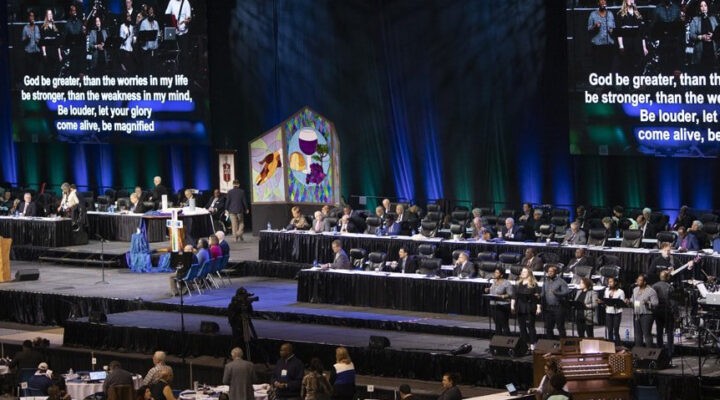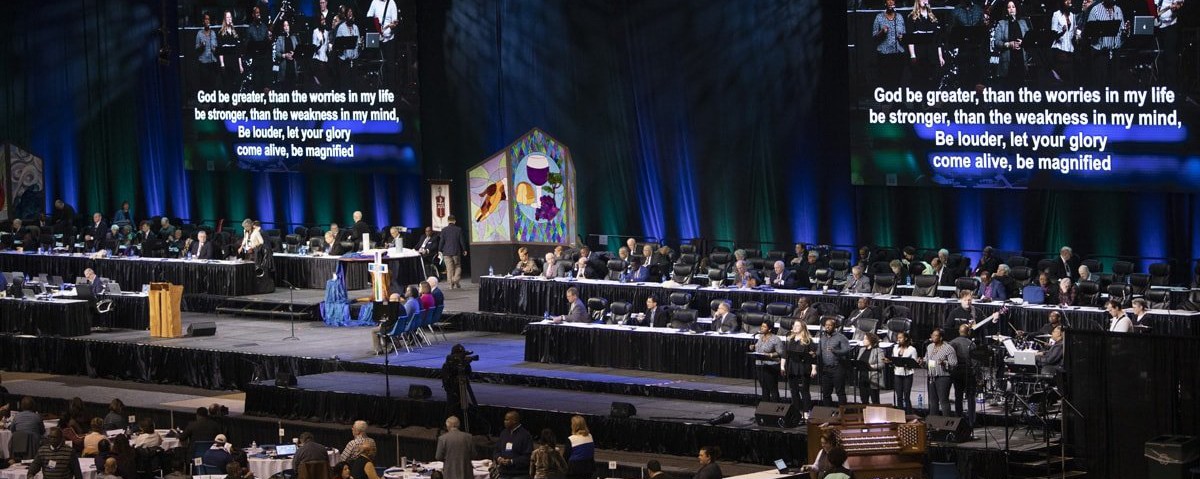United Methodist politics erupted in a public confrontation this week as three international bishops and a dozen other church leaders denounced a traditionalist group’s offer to provide coronavirus immunizations for General Conference delegates from countries with limited vaccine access.
The Wesleyan Covenant Association, an ad hoc organization of traditionalist United Methodists seeking to start a new denomination, announced Jan. 7 that it had raised $135,000 to provide coronavirus vaccinations for delegates in countries where vaccine access is limited. Their effort is aimed primarily at African countries where the WCA has strong United Methodist support for its proposal to start a new conservative denomination it calls the Global Methodist Church.
In response, a group of church leaders from outside the United States, mainly Africa and the Philippines, published a rebuttal Jan. 14 in an exclusive article for United Methodist Insight, an independent online journal. Less than a week later, three bishops representing the UMC’s Africa, Europe and Philippines regions issued a rare public denunciation of the WCA’s plan. The bishops soon were joined by a chorus of other UMC leaders, according to a news report by Heather Hahn of UM News.
Four objections
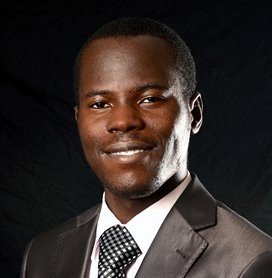
Albert Otshudi Longe
Primary authors of the Insight article — Albert Otshudi Longe of Democratic Republic of Congo, Lloyd T. Nyarota of Zimbabwe and Kennedy Mwita of Kenya — outlined reasons why they think the WCA’s offer actually would harm the delegates and countries in question.
First, they wrote, “Is the WCA support for vaccination intended to protect delegates or to meet the visa requirement for travel to the USA? If it is to protect the delegates, what about possible contamination to the family and neighbors? As delegates need to travel to vaccination sites, some will need to take flights and spend close to a month in hotels to get the two doses. There is, therefore, increased exposure, and in countries with limited access to quality health care, it is a significant risk to take.”
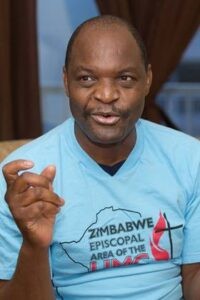
Lloyd Nyarota
Second, said the authors, misinformation casts a cloud over the proposal. “Given widespread myths around COVID-19 and vaccines that led to resistance to vaccination, funding to vaccinate select groups of people will be subjected to misinterpretations about the purpose of vaccines. People are bound to question the motivation to fund a vaccination drive for only select people and the liabilities that come with it. … Already there is speculation about whether the true purpose of the WCA’s initiative is public health or church politics.”
Third, the authors questioned the ethics of vaccinating only General Conference delegates when there is serious need to address the inequality of health care access around the world, especially regarding coronavirus vaccinations. According to the World Health Organization, only about 9% of Africans had been vaccinated against COVID-19 as of Dec. 31, 2021. “Poor health infrastructure, a lack of funding for training and deploying medical staff, as well as vaccine storage issues have all played a part,” reported the BBC.
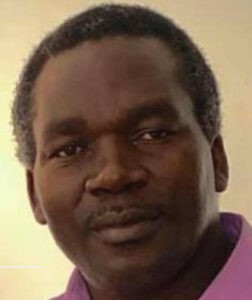
Kennedy Mwita
Finally, the authors decried the WCA’s strategy as racist and neo-colonial: “A vast majority of our central conference delegates are persons of color from countries that continue to experience the harm of colonialism,” the authors said. “Subjecting them to the risks enumerated above sends a message that their lives are expendable in order to satisfy the desire of some to convene General Conference despite obvious public health risks.”
Racism and colonialism?
Echoing allegations of racism and colonialism in a subsequent statement, United Methodist bishops Harald Rückert of Germany, Eben Nhiwatiwa of Zimbabwe and Rodolfo (Rudy) Juan of the Philippines chastised the WCA for proposing selective vaccination in opposition to the UMC’s campaign around increasing vaccine access and medical care called “Love Beyond Borders.” So far United Methodists have contributed $240,000 to the fund, which supports UNICEF in gathering and distributing coronavirus vaccines in low-income nations.
“Offering vaccines to General Conference delegates or covering the cost of delegates to travel to places where they can be vaccinated is not an expression of vaccine equity,” the bishops wrote. “Rather, it appears as an attempt to benefit those who have been given a special responsibility, and who the donor wishes to fulfill a certain purpose.”
“It appears as an attempt to benefit those who have been given a special responsibility, and who the donor wishes to fulfill a certain purpose.”
Juan told UM News that Filipino United Methodists “have received the bishops’ statement with joy. They are grateful to the central conference leadership for courageously coming out with a collective stand against the WCA’s ‘colonial’ intervention.” Some African delegates told UM News that their real need was not for vaccinations but for coronavirus test kits to meet travel requirements and for visas to enter the United States.
A defense of good intentions
Wesleyan Covenant Association President Keith Boyette asserted to UM News that his group’s intention was to make sure General Conference could proceed this year after being postponed twice because of the coronavirus pandemic. General Conference is slated for Aug. 29 through Sept. 6 in Minneapolis, meaning international delegates must meet the U.S. entry requirement of coronavirus vaccination and negative COVID-19 tests. General Conference organizers told UM News they have considered facilitating vaccinations for all delegates, but so far have found “logistical, ethical, legal, medical and financial complexities that seem to be insurmountable.”
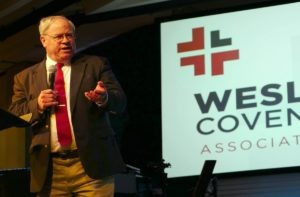
Keith Boyette
One of the items on the agenda for the next General Conference is a plan to split the UMC called the “Protocol of Reconciliation & Grace through Separation,” negotiated independently by various groups including the WCA in 2019. If adopted, the Protocol, as it’s known, would provide $25 million in seed money over four years to a “traditionalist” denomination and another $2 million for other “expressions” of Methodism. The WCA sees itself as the recipient of the portion designated for a traditionalist church, although the Protocol doesn’t specify the WCA as a recipient and details of such a separation would have to be worked out by General Conference delegates.
Not a new conflict
This isn’t the first time traditionalist United Methodists’ tactics have ignited a furor. Part of the sharp reaction to the vaccination offer can be traced to past experiences with the WCA and other conservative caucuses.
For example, on Dec. 28, 2021, blogger Jeremy Smith of Hacking Christianity reported a discrepancy between a recent comment by Thomas Lambrecht, vice president of the conservative caucus Good News, and Lambrecht’s 2004 strategy for the organization.
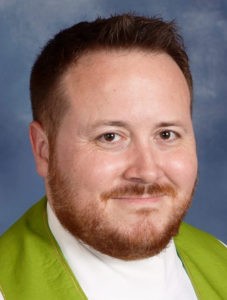
Jeremy Smith
Smith posted a screen capture of a Nov. 3, 2021, tweet by Good News Magazine of a quote from Lambrecht’s column: “Part of the ‘grace’ alluded to in the name of the Protocol is the idea that all groups want any denominations that emerge under the Protocol, as well as the post-separation United Methodist Church, to be as strong and vibrant as possible, set up to succeed, rather than fail.”
Calling Lambrecht’s quote “the biggest whopper the WCA ever told,” Smith wrote: “The above quote by Rev. Thomas Lambrecht of the Good News movement — that traditionalists want the UMC to be ‘set up to succeed, rather than fail’ — is in stark contrast with the 2004 strategy document that Rev. Lambrecht himself penned that details why Traditionalists ought not leave a ‘strong’ UMC behind. This document also provided the baseline for their successful strategy at the 2019 General Conference, which backfired spectacularly and would have ran them out of options except the coronavirus happened.”
In addition, for the past two decades conservative caucuses have conducted “orientation sessions” for international delegates at private locations in advance of General Conference. Participants at one such session held prior to the special 2019 General Conference, who spoke on condition of anonymity for fear of reprisals at home, told of being instructed not only how to use electronic voting devices but also specifically how to vote on legislation.
At the 2008 General Conference in Fort Worth, Texas, a coalition including conservative caucuses Good News, the Confessing Movement and the Institute on Religion and Democracy purchased cell phones for international delegates. The coalition asserted that the phones were intended for international delegates to “call home,” but irate U.S. and European delegates alleged the phones were meant to communicate instructions on how to vote on legislation. In reaction, delegates to the Fort Worth conclave approved a ban on using “electronic devices” inside the voting bar of the conference.
General Conference organizers must decide by mid-March whether to go ahead with this year’s legislative assembly, based on criteria it adopted last fall. Thanks to this latest episode, what happens between now and then is anybody’s guess.
Cynthia B. Astle is a veteran journalist who has covered the worldwide United Methodist Church at all levels for more than 30 years. She serves as editor of United Methodist Insight, an online journal she founded in 2011.
Related articles:
Now there appear to be three paths for once-united Methodists | Analysis by Cynthia Astle
New denomination declares ‘liberation’ from United Methodist Church | Analysis by Cynthia Astle
Reformed Church in America charts a new course as 43 churches jump ship
Dis-membered denominations: Forgetting who we are | Opinion by Bill Leonard
Diana Butler Bass: SBC decline dispels idea that only liberal denominations die
Are denominational bodies doomed? | Opinion by Bill Wilson

